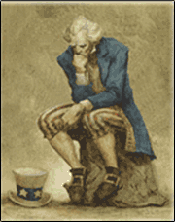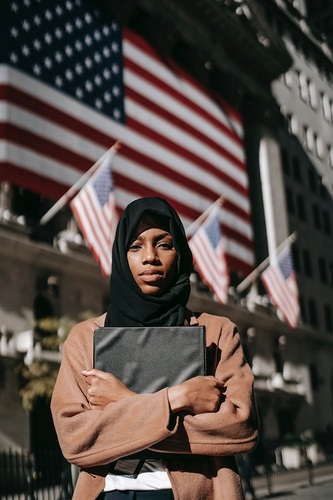
–>
November 9, 2022
Muslims in America are more Islamophobic than any other demographic in the United States. According to a recent poll, American Muslims saw fellow Muslims as being more uncivilized, prone to violence, and more hostile to the United States than any other group, and often by very large margins. For example, whereas 19% of Muslims polled believed that fellow Muslims were uncivilized, only 5% of the general American population agreed.
‘); googletag.cmd.push(function () { googletag.display(‘div-gpt-ad-1609268089992-0’); }); }
What does one make of these unexpected findings? Remember, ever since the strikes of 9/11, the unwavering, “mainstream” narrative has been that Islamophobia — defined as “unfounded fear of and hostility towards Islam” by Americans — has been the root of all problems between Americans and Muslims. According to this narrative, because xenophobic Americans, in their ignorance of “true Islam,” dislike and suspect Muslims, the latter, out of frustration and resentment, only naturally lash out.
Now, however, we find that it is American Muslims themselves who are by far the ones most prone to exhibiting “unfounded fear of and hostility towards Islam.”
How does one explain this seeming conundrum?
‘); googletag.cmd.push(function () { googletag.display(‘div-gpt-ad-1609270365559-0’); }); }
According to the Institute for Social Policy and Understanding (ISPU), the Dearborn Muslim think tank that conducted this poll, even this finding, that Muslims are more prone to exhibiting symptoms of Islamophobia than non-Muslims, is still, not only the fault of American society in general but — you guessed it — racism.
For example, ISPU asserts that:
[I]nternalized Islamophobia is more prevalent among younger Muslims than older members of the community, Americans who have lived the majority of their lives after 9/11/2001 in a country that has demonized their identity in popular culture, news media, political rhetoric, and in policy. Research suggests that this kind of steady drumbeat of bigoted ideas and state actions have a detrimental impact on the target group’s self-image and mental health.
As proof, ISPU quotes one of its own fellows, Dr. Muniba Saleem, saying “minorities can internalize the negative stereotypes of their group,” which “can influence their self-esteem, psychological distress, motivation, and performance.”
Moreover, for ISPU, “another noteworthy and alarming finding” was that “white Muslims” tend to exhibit more Islamophobia than non-white Muslims. The assumption here is that, apparently because racial identity always trumps religious identity (many would argue the reverse), white Muslims are becoming racists against even themselves?
While such psychoanalytical appeals and rationalizations — or in layman’s terms, mumbo-jumbo — might be expected from ISPU, whose bread and butter has long been to present Islamophobia as the leading cause of injustice for Muslims in America, two other unspoken but plausible reasons make more sense of this seeming oxymoron of Muslim-Islamophobia.
‘); googletag.cmd.push(function () { googletag.display(‘div-gpt-ad-1609268078422-0’); }); } if (publir_show_ads) { document.write(“
 First, is the obvious: because no one understands Islam better than Muslims, it is only to be expected that it is they who most “fear” (phobia) Islam. This especially makes sense for American Muslims: torn between two antithetical cultures and norms, more “Americanized” Muslims have had brushes with their more “purist” coreligionists which have made them conclude that fellow Muslims are more prone to violence, anti-Americanism, and incivility — or, in a word, that has made them more Islamophobic than non-Muslim Americans, most of whom have little direct experience of Muslims.
First, is the obvious: because no one understands Islam better than Muslims, it is only to be expected that it is they who most “fear” (phobia) Islam. This especially makes sense for American Muslims: torn between two antithetical cultures and norms, more “Americanized” Muslims have had brushes with their more “purist” coreligionists which have made them conclude that fellow Muslims are more prone to violence, anti-Americanism, and incivility — or, in a word, that has made them more Islamophobic than non-Muslim Americans, most of whom have little direct experience of Muslims.
Think of, for example, the negative encounters that many born Muslims in America, who otherwise behave like most Americans, must have experienced vis-à-vis their more “radical” coreligionists: they have been castigated, if not worse, for dressing like Americans (especially non-hijab wearing women), drinking the occasional alcoholic beverage, freely consorting with the opposite (and infidel!) sex, and, worst of all, harboring liberal beliefs (e.g., that homosexuality is natural, etc.).
Remember, Islam punishes by, at the very least, ostracizing those Muslims perceived as “apostatizing” from, including by being indifferent to, Islam — when not killing them altogether.
This, as opposed to ISPU’s reasoning — that Muslims are “internalizing the negative stereotypes of their group” — would seem to better explain why those Muslims, as ISPU found, who have spent most of their lives in America are especially Islamophobic.
The second, more subtle, reason that American Muslims might have responded “yes” to questions on whether Muslims are more prone to violence, anti-Americanism, and being uncivilized, is, believe it or not, because those Muslims are actually proud of being and want others to see them as such.
It is almost futile here quoting Muslims boasting of how they embrace violence and hate America in the name of their religion — they are everywhere (even if hidden by Google algorithms) especially in Arabic media — but even the curious notion that some Muslims wish to be seen as uncivilized has a long pedigree.
When, for example, the Islamic State made proclamations that “American blood is best and we will taste it soon,” or “We love death as you love life,” they were merely quoting the uncivilized words of Muhammad’s earliest companions. After an Eastern Roman general offered gold to Khalid bin al-Walid (the “Sword of Allah”), in exchange for the Muslims’ withdrawal from then Christian Syria, where they had been slaughtering and terrorizing the infidels, the Arab general responded by saying that they had not come for money, but rather, “we Arabs are in the habit of drinking blood, and we are told the blood of the Romans is the sweetest of its kind, so we came to shed your blood and drink it.”
In short, for many Muslims in America, it’s rather “cool” to be thought of as violent, anti-American, and, yes, even uncivilized — since civilization, as Ibn Khaldun laid out centuries ago, is for the weak and feeble, not the virile, uber-lions of Islam.
Here, then, are two more logical reasons — one with positive, the other negative, implications — as to why Muslims in America are more Islamophobic than everyone else.
Raymond Ibrahim, author of Defenders of the West: The Christian Heroes Who Stood Against Islam, is a Shillman Fellow at the David Horowitz Freedom Center, a Judith Rosen Friedman Fellow at the Middle East Forum, and a Distinguished Senior Fellow at the Gatestone Institute.
Image: Pexels
<!– if(page_width_onload <= 479) { document.write("
“); googletag.cmd.push(function() { googletag.display(‘div-gpt-ad-1345489840937-4’); }); } –> If you experience technical problems, please write to [email protected]
FOLLOW US ON
<!–
–>
<!– _qoptions={ qacct:”p-9bKF-NgTuSFM6″ }; ![]() –> <!—-> <!– var addthis_share = { email_template: “new_template” } –>
–> <!—-> <!– var addthis_share = { email_template: “new_template” } –>





